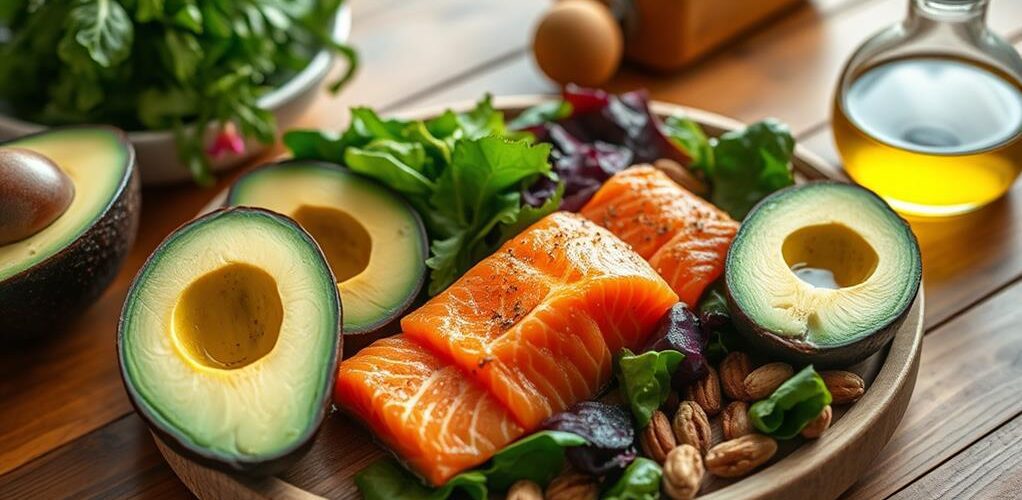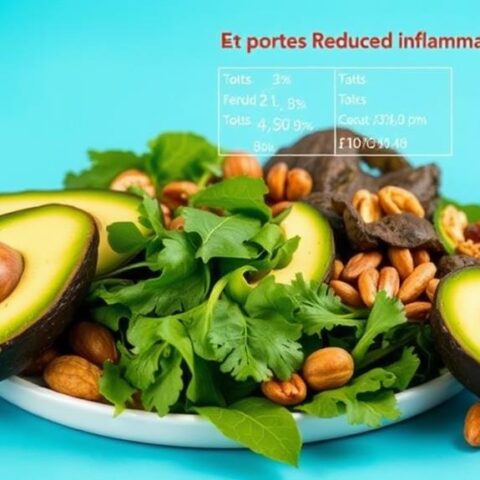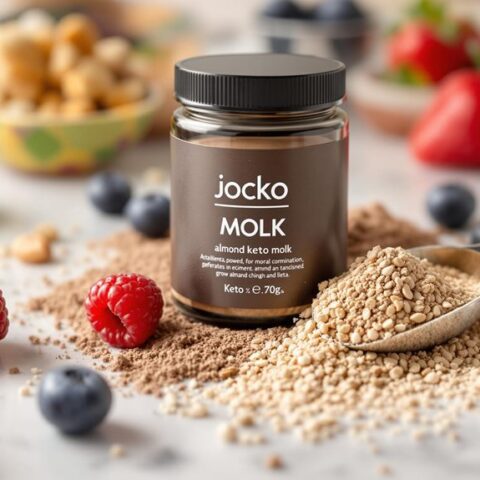
The ketogenic diet, with its focus on low carbs and high fats, is like a superhero against inflammation! It encourages the body to produce ketones, magical molecules that can calm down those pesky inflammatory signals. Less carbs mean steadier blood sugar, reducing spikes that stir up inflammation. And guess what? Healthy fats from avocados and fish have special powers that lower inflammation too! The keto diet also helps manage chronic diseases linked to inflammation, like heart disease and diabetes. Want to discover how else this marvel diet tackles inflammation? Buckle up, exciting facts await!
Key Takeaways
- Ketogenic diet reduces inflammatory markers like TNF-α and IL-6, lowering chronic inflammation.
- Ketones produced in ketosis inhibit the NLRP3 inflammasome, reducing inflammation.
- Low carbohydrate intake stabilizes blood sugar, reducing insulin spikes and pro-inflammatory cytokine levels.
- Healthy fats such as omega-3s, avocados, and fatty fish support immune function and lower inflammation.
- Keto diet may benefit autoimmune conditions by lowering inflammation and stabilizing blood sugar levels.
What Is Inflammation?
In its essence, inflammation is an immune response activated by the body to protect against injury, illness, or infection. Imagine it like your body's alarm system, calling in reinforcements to fight off invaders. When you get a cut or catch a cold, your body sends an army of cells to the rescue, causing redness, pain, and swelling.
These are signs of acute inflammation, a short-term response that usually helps you heal.
But what happens when this immune response doesn't turn off? Sometimes, inflammation sticks around longer than it should, leading to chronic inflammation. Chronic inflammation is like a low-grade fire that never fully burns out. It can quietly cause damage over time. This sneaky type of inflammation is tied to serious health issues like heart disease, diabetes, and rheumatoid arthritis.
Scientists use special tests to find inflammatory markers in your blood, which are like clues showing that your body is fighting something off. Understanding how inflammation works can help us figure out ways to reduce these markers.
For example, some diets, like the ketogenic diet, might help lower inflammation and improve health. So, learning about inflammation is super important for staying healthy!
Chronic Inflammation and Health
Chronic inflammation is like a slow-burning fire inside your body, and it can cause serious damage over time.
Things like getting older, carrying extra weight, smoking, and eating too much junk food can all make this inflammation worse.
Because it's linked to diseases like heart disease, diabetes, and even cancer, understanding how our diet affects inflammation is super important for staying healthy.
Inflammation's Underlying Mechanisms
The intricate mechanisms underlying chronic inflammation involve a prolonged, low-grade immune response that, over time, can inflict significant tissue damage and contribute to the development of diseases such as heart disease, diabetes, and rheumatoid arthritis.
This persistent inflammation is driven by complex inflammatory pathways and the release of pro-inflammatory cytokines, like TNF-α and IL-6, which keep the immune system in a constant state of alert.
Chronic stress and oxidative stress further fuel the fire, disrupting hormonal balances and causing harmful changes in the gut microbiome.
Inadequate dietary fiber and nutrient deficiencies can also play a role, weakening the body's defenses and making it more susceptible to prolonged inflammation.
Some key factors that contribute to chronic inflammation include:
- Lifestyle modifications: Aging, smoking, sleep deprivation, and physical inactivity.
- Dietary choices: High intake of refined sugars and unhealthy fats.
- Immune responses: Food intolerances and allergies that trigger inflammation.
The World Health Organization considers chronic inflammatory diseases a major global health threat, highlighting the urgent need for effective strategies to manage and reduce inflammation.
Understanding these underlying mechanisms helps us combat the silent damage inflammation causes, paving the way to healthier lives.
Dietary Impact on Inflammation
A pivotal factor in managing chronic inflammation is diet, which profoundly influences the body's inflammatory state. Chronic inflammation, driven by aging, poor diet, and a sedentary lifestyle, is linked to conditions like heart disease, diabetes, and rheumatoid arthritis. Hence, adopting the right dietary strategies is essential.
The ketogenic diet (KD) restricts carbohydrates, making the body burn fat and produce ketones. These ketones can inhibit the NLRP3 inflammasome, a key player in inflammation. Research shows that sticking to a ketogenic diet can greatly lower pro-inflammatory cytokines such as TNF-α and IL-6, with drops of -0.32 pg/mL and -0.27 pg/mL respectively. This indicates that a keto diet can be a powerful anti-inflammatory tool.
Avoiding inflammatory foods like refined sugars and high glycemic index foods is vital, as they can spike insulin levels and worsen chronic inflammation. Instead, an anti-inflammatory ketogenic diet focuses on clean fats, such as olive oil and avocados.
It also includes non-starchy vegetables and anti-inflammatory spices like turmeric. These dietary strategies not only help reduce inflammation markers but also promote overall health, making a strong case for the ketogenic diet as a beneficial approach to managing chronic inflammation.
Keto Diet Basics
Understanding the fundamentals of the ketogenic diet is essential for grasping its potential health benefits. The keto diet, known for its low-carb, high-fat approach, limits carbohydrate intake to less than 50 grams per day, which is about the amount in a small apple. This drastic reduction in carbs forces the body to switch its energy source from glucose to ketones and fatty acids, a state known as ketosis.
Achieving ketosis usually takes around three days, during which the liver starts producing ketones. This shift in energy source can be challenging, but with proper keto meal planning, it becomes manageable. You'll want to focus on foods high in healthy fats and moderate in protein.
Here are some basics to get you started:
- Keto Meal Planning: Plan meals that include plenty of avocados, nuts, seeds, and fatty fish.
- Ketogenic Snacks: Look for snacks such as cheese, olives, and hard-boiled eggs.
- Hydration: Drink plenty of water and consider electrolyte supplements to stay hydrated.
Originally developed as a treatment for epilepsy in 1921, the ketogenic diet has recently gained popularity for its potential in weight loss and managing inflammatory conditions like arthritis.
Anti-Inflammatory Ketones
While the ketogenic diet is widely recognized for its weight loss benefits, its potential to combat inflammation is gaining considerable scientific interest.
Ketone metabolism, a hallmark of the ketogenic diet, produces ketones such as β-hydroxybutyrate (BHB). These ketones act as powerful anti-inflammatory signaling molecules. One impressive way they work is by inhibiting the NLRP3 inflammasome, a major player in the body's inflammatory response. Think of ketones as tiny firefighters, rushing in to cool down the flames of inflammation!
Furthermore, ketones activate anti-inflammatory pathways, including the upregulation of the CtBP gene. This gene helps in dialing down the body's inflammatory reactions.
Research has shown that sticking to a ketogenic diet can markedly reduce levels of inflammatory markers like TNF-α by an average of -0.32 pg/mL. So, it's like having a built-in defense system against inflammation.
What's even cooler is that the inflammation reduction is boosted by weight loss. Less body fat means fewer pro-inflammatory cytokines being released from fat tissue. It's a win-win!
Blood Sugar and Inflammation

High blood sugar levels are a considerable contributor to chronic inflammation, and the ketogenic diet's ability to restrict carbohydrate intake plays an essential role in mitigating this issue. When we consume high-carb foods, our blood sugar spikes, leading to heightened insulin levels. This can cause insulin resistance, making it harder for our bodies to regulate blood sugar effectively.
Insulin resistance is linked to an increase in pro-inflammatory cytokines, which can worsen chronic inflammation. By following a ketogenic diet, we lower our carbohydrate intake, which helps stabilize blood sugar levels. This not only reduces the risk of insulin resistance but also promotes the production of ketones.
These ketones act as anti-inflammatory signaling molecules, inhibiting the NLRP3 inflammasome and reducing pro-inflammatory cytokine production.
- Reduced TNF-α and IL-6: Research shows that a sustained ketogenic diet considerably lowers these inflammatory markers.
- Stable blood sugar levels: This diet helps activate anti-inflammatory genes, like CtBP.
- Lower insulin levels: Decreasing insulin spikes reduces pro-inflammatory cytokines.
Glutamate and GABA Balance
Now, let's talk about the balance between glutamate and GABA in your brain and how it relates to inflammation.
Glutamate acts like a gas pedal for your brain, making neurons more excited, while GABA works like the brakes, calming things down.
The ketogenic diet helps increase GABA levels, which can counteract the effects of too much glutamate, reducing inflammation and promoting better brain health.
Neurotransmitter Regulation Impact
The ketogenic diet has a profound impact on neurotransmitter regulation, particularly concerning the balance between glutamate and gamma-aminobutyric acid (GABA). This balance is essential for maintaining neurological health, and the keto diet plays a pivotal role in ensuring neurotransmitter synergy and excitotoxicity reduction.
By restricting carbohydrates, the keto diet lowers blood sugar levels, which can suppress the release of glutamate, an excitatory neurotransmitter linked to neuroinflammation. This suppression is important because an excess of glutamate can lead to excitotoxicity, a condition where nerve cells are damaged and killed by overactivation.
On the flip side, the ketogenic diet increases levels of GABA, an inhibitory neurotransmitter that helps reduce neuronal excitability and offers neuroprotective effects.
- Neurotransmitter Synergy: The keto diet promotes a balance between excitatory and inhibitory neurotransmitters.
- Excitotoxicity Reduction: Lower glutamate levels reduce the risk of neuronal damage.
- Neuroprotective Ketone Bodies: Ketosis enhances the production of substances that support healthy brain function.
These adjustments can alleviate symptoms associated with disorders characterized by glutamate dysregulation, such as anxiety and epilepsy, making the ketogenic diet a promising approach for improving brain health and mitigating inflammation.
Ketogenic Diet Influence
Implementing a ketogenic diet can greatly influence the balance between glutamate and gamma-aminobutyric acid (GABA), essential neurotransmitters that regulate brain function and inflammatory responses.
When you follow a keto diet, you cut down on carbs, which lowers your blood sugar. This reduction helps decrease inflammation and even turns on anti-inflammatory genes like CtBP. Pretty cool, right?
Now, let's talk about GABA. It's like a calming buddy for your brain, helping reduce anxiety and inflammation. The keto diet can bump up GABA levels, making you feel more relaxed and less inflamed.
On the flip side, too much glutamate can cause problems like neuroinflammation and excitotoxicity. The keto diet helps balance glutamate, offering some much-needed neuroprotective effects.
But wait, there's more! When you switch to burning ketones for energy, it can make your brain more adaptable to stress, promoting a happier, calmer mind.
Ketones also inhibit the NLRP3 inflammasome, a big player in inflammation. So, with keto adaptability, you get inflammation reduction, too.
In short, the ketogenic diet isn't just a way to lose weight. It's a powerful tool for balancing important brain chemicals and reducing inflammation.
Foods That Cause Inflammation

Dietary choices play an essential role in either mitigating or exacerbating inflammation within the body. Inflammatory foods can act as dietary triggers, leading to various health issues.
Refined sugars, commonly found in processed foods, are notorious for increasing levels of C-reactive protein (CRP), a marker of inflammation. This not only raises the risk of chronic diseases but also makes you feel sluggish and tired.
High glycemic index diets spike insulin levels, contributing to chronic inflammation. Such diets promote insulin resistance and increase pro-inflammatory cytokines, which can make you feel like you're on a constant rollercoaster of energy highs and lows. It's not just your mood that suffers; your body does too.
Vegetable oils, particularly those high in omega-6 fatty acids like soybean oil, can also be problematic. Consuming these oils in excess can exacerbate inflammation and even contribute to obesity. It's like adding fuel to the fire, making everything worse.
- Refined sugars
- High glycemic index foods
- Vegetable oils high in omega-6
Benefits of Healthy Fats
Healthy fats, like those in olive oil, avocados, and fatty fish, are super important on a keto diet because they help fight inflammation and keep you healthy.
Omega-3s from fish and flaxseeds can lower bad markers in your body, cutting down the risk of diseases we all want to avoid.
Plus, fats from nuts and seeds can make your gut happy and boost your immune system, giving you a better chance at staying inflammation-free.
Sources of Healthy Fats
A variety of nutrient-dense sources of healthy fats are pivotal for reducing inflammation and promoting overall well-being. Including these fats in your diet can help you feel better and stay healthier.
Let's look at some key sources.
Avocado benefits include being rich in monounsaturated fats, which are great for heart health and can help lower bad cholesterol levels. Plus, they're delicious on toast or in salads!
Coconut oil is another fantastic option. It contains medium-chain triglycerides (MCTs), which can give you a quick energy boost and help reduce inflammation. You can use it for cooking or even in your coffee for a tasty twist.
Other excellent sources of healthy fats include:
- Olive oil: Packed with antioxidants and healthy fats, it's perfect for drizzling over salads or cooking at low temperatures.
- Fatty fish: Salmon, mackerel, and sardines are rich in omega-3 fatty acids, known for their anti-inflammatory properties.
- Nuts and seeds: Almonds, walnuts, flaxseeds, and chia seeds are loaded with monounsaturated fats and can be easily added to various dishes.
Incorporating these sources into your diet can make a big difference in managing inflammation and boosting overall health.
Role in Reducing Inflammation
Understanding the impact of these nutrient-dense fats on inflammation reveals their significant role in a ketogenic diet. Healthy fats like those from olive oil, avocado, and fatty fish are essential. These fats help reduce inflammation by increasing omega-3 fatty acids and decreasing omega-6 levels. Omega-6 fatty acids can promote inflammation, so balancing them with more omega-3s is key to inflammation reduction.
The keto benefits don't stop there. The diet promotes the production of ketone bodies, such as beta-hydroxybutyrate (BHB), which have anti-inflammatory properties. BHB inhibits the NLRP3 inflammasome and reduces pro-inflammatory cytokines, calming down the body's inflammatory responses.
Lowering carbs and replacing them with healthy fats also lowers insulin levels, which is another way the ketogenic diet can help reduce inflammation.
Studies show that people on a ketogenic diet with a focus on nutrient-dense, anti-inflammatory fats see improvements in inflammation markers like TNF-α and IL-6. Adding anti-inflammatory spices like turmeric and cinnamon can boost these keto benefits even more.
These spices contain compounds that fight inflammation and oxidative stress. So, the ketogenic diet, rich in healthy fats, offers a powerful way to reduce inflammation.
Impact on Overall Health
The incorporation of nutrient-dense fats into a ketogenic diet has profound implications for overall health. You see, the keto benefits go beyond just weight loss; they include significant inflammation reduction too.
Healthy fats like those in olive oil, avocados, and fatty fish are superstars in this diet. They help lower inflammation markers such as TNF-α and IL-6, which is fantastic news for your body!
Benefits of Healthy Fats on a Keto Diet:
- Lower Systemic Inflammation: Monounsaturated and polyunsaturated fats help keep inflammation levels down, reducing the risk of chronic diseases.
- Enhanced Joint Health: Omega-3 fatty acids from fish and flaxseed can improve joint health, especially for those with rheumatoid arthritis.
- Anti-inflammatory Effects: Ketone bodies inhibit the NLRP3 inflammasome, cutting down on pro-inflammatory cytokines.
A clean ketogenic diet focuses on high-quality, nutrient-rich fats, supporting metabolic health and boosting resilience against inflammation.
This means better overall well-being and potentially a longer, healthier life. So, while enjoying that creamy avocado or a piece of salmon, know you're not just eating well—you're also fighting inflammation and supporting your health in amazing ways!
Keto and Autoimmune Conditions

Emerging evidence suggests that the ketogenic diet may offer significant benefits for individuals suffering from autoimmune conditions such as lupus, psoriatic arthritis, and rheumatoid arthritis. This diet, known for its high-fat and low-carb approach, seems to provide real keto benefits, especially for those seeking autoimmune relief.
One of the key ways the keto diet helps is by lowering pro-inflammatory cytokines like TNF-α and IL-6. These are fancy terms for proteins that can cause inflammation and pain in the body. By reducing these proteins, the keto diet might help manage chronic inflammation, which is a big deal for people with autoimmune diseases.
Anecdotal reports have also shown that some people feel less pain and can even cut back on their medications when they stick to a ketogenic diet.
Plus, the diet's ability to stabilize blood sugar levels can further reduce inflammation, making it a double win.
While scientists agree that more research is needed, many individuals share positive experiences, suggesting that the keto diet's anti-inflammatory effects could be a game-changer for managing autoimmune symptoms.
Gut Health on Keto
Gut health is a critical aspect of overall well-being, and its interplay with the ketogenic diet is a topic of increasing fascination among researchers and healthcare professionals.
The gut microbiome, which is the collection of all the microorganisms living in our intestines, can be rapidly altered by the ketogenic diet. This diet may increase beneficial bacteria, but its long-term effects can be a little tricky due to the low intake of fiber-rich foods.
The ketogenic diet's high-fat content can change gut permeability and inflammation levels, which in turn impacts overall gut health and systemic inflammation.
Curiously, while the Standard American Diet (SAD) is linked to chronic inflammation due to high refined sugar and unhealthy fats, the keto diet might counteract these harmful effects by promoting a healthier gut environment.
- The keto diet can enhance gut health by reducing inflammation and supporting the growth of anti-inflammatory bacteria.
- Long-term adherence to keto may decrease protective gut bacteria because of low fiber intake.
- Consulting healthcare providers is essential to address potential nutrient deficiencies that can affect gut health.
More research is needed to fully understand the long-term impact of the ketogenic diet on gut health.
Nutritional Considerations

Keto for inflammation necessitates careful attention to nutritional considerations to guarantee both efficacy and safety. One key aspect is nutrient timing, which can help manage inflammation by ensuring consistent energy levels and stable blood sugar. This includes balancing meals throughout the day with nutrient-dense foods.
Micronutrient balance is another significant factor. The ketogenic diet's restrictive nature often limits the intake of antioxidant-rich fruits and vegetables, raising the risk of deficiencies in essential vitamins like vitamin C and E. Consulting a keto-literate healthcare provider can provide guidance on incorporating necessary supplements and specific foods to maintain a healthy micronutrient balance.
Moreover, the low fiber content of the keto diet can impact gut health, potentially increasing inflammation markers. Therefore, including non-starchy vegetables and considering fiber supplements can help support a healthy gut microbiome and reduce inflammation.
Foods rich in omega-3 fatty acids, such as fish and flaxseed, should also be prioritized for their anti-inflammatory properties.
Emphasizing whole, unprocessed foods is essential. These not only provide a range of nutrients but also help avoid the pitfalls of processed keto foods, which can undermine both gut health and inflammation management.
Addressing Controversies
While focusing on nutritional considerations is fundamental for the ketogenic diet's efficacy in managing inflammation, it is equally important to address the controversies surrounding this dietary approach.
Keto sustainability is a major point of debate. Critics argue that the diet's low fiber and high fat content could lead to negative health impacts over time. They worry about potential nutritional deficiencies, particularly in antioxidant vitamins found in fruits and vegetables.
Additionally, the keto diet's restrictive nature can make it hard for people to stick with it. Shifting from a high-carb to a low-carb diet can be tough, as it alters fat metabolism and affects how enjoyable the diet is for different people. This is where dietary personalization becomes vital, as not everyone will have the same experience or benefits.
- Nutritional Deficiencies: The lack of fruits and vegetables can lead to missing essential vitamins.
- Adherence Challenges: The strict nature of the diet can make long-term commitment difficult.
- Fat Selection: Choosing the right fats is essential, as high saturated fat intake can increase inflammation markers.
Emerging research suggests a one-size-fits-all approach doesn't work, especially for chronic inflammation. Individual needs vary, and a personalized diet plan is necessary for effective management.
Research and Future Directions

Recent research has started to illuminate the potential anti-inflammatory benefits of the ketogenic diet (KD). Emerging studies suggest that the KD may effectively reduce inflammation markers such as TNF-α and IL-6, highlighting its potential therapeutic role in managing inflammatory conditions. Current literature indicates a significant reduction in TNF-α levels (WMD: -0.32 pg/mL; P = 0.007) and IL-6 levels (WMD: -0.27 pg/mL; P = 0.036) with adherence to the KD.
| Marker | Reduction (WMD) | P-value |
|---|---|---|
| TNF-α | -0.32 pg/mL | 0.007 |
| IL-6 | -0.27 pg/mL | 0.036 |
Further research is needed to clarify the specific mechanisms by which KD modulates inflammation, particularly regarding its effects on chronic inflammatory conditions like rheumatoid arthritis and obesity. Future prospective studies are essential to explore the long-term impacts of the KD on cardiovascular health in individuals with rheumatic diseases. The need for well-designed clinical trials is emphasized to validate the anti-inflammatory claims of the KD and to determine suitable dietary protocols for various inflammatory conditions.
| Research Area | Focus | Importance |
|---|---|---|
| Mechanisms Exploration | How KD reduces markers | Understanding KD's anti-inflammatory effects |
| Clinical Implications | Long-term impacts | Ensuring safety and efficacy |
| Future Trials | Protocols and outcomes | Optimizing KD for inflammatory conditions |
The mechanisms exploration and clinical implications of these findings underscore the need for rigorous future research.
Frequently Asked Questions
Does Keto Reduce Inflammation?
Yes, the keto diet considerably reduces inflammation markers. Keto benefits include decreased TNF-α and IL-6 levels, inhibition of the NLRP3 inflammasome, and lower insulin secretion, collectively contributing to reduced chronic inflammation and its associated conditions.
Why Do My Joints Feel Better on Keto?
The reduction in joint pain may be attributed to the anti-inflammatory effects of dietary fats utilized in the ketogenic diet. Ketones produced during ketosis alleviate inflammation, resulting in improved joint function and reduced discomfort.
Are Ketone Bodies Anti-Inflammatory?
Yes, ketone bodies are anti-inflammatory. Through ketone metabolism, particularly beta-hydroxybutyrate (BHB), the inflammatory response is mitigated by inhibiting the NLRP3 inflammasome and reducing pro-inflammatory cytokines like TNF-α and IL-6.
Does a Keto Diet Help Autoimmune Disease?
The ketogenic diet may offer autoimmune benefits by reducing systemic inflammation through dietary changes. Emerging research and anecdotal evidence suggest it can alleviate symptoms and decrease medication needs, but further studies are required to confirm these effects.
Conclusion
The keto diet may offer potential benefits for reducing inflammation through mechanisms like ketone production, improved blood sugar control, and enhanced gut health. While evidence is promising, ongoing research is necessary to fully understand its impact on chronic inflammation and overall health. Nutritional considerations and potential controversies must be addressed to guarantee a balanced approach. Future studies will help clarify the role of the keto diet in managing inflammation and inform dietary recommendations.










No Comments